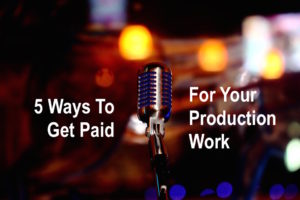- in Book Excerpt , Production by Bobby Owsinski
5 Ways To Get Paid For Your Production Work
 If you’re a producer, engineer or musician, chances are that you’ve been asked to work on someone’s recording. That’s all well and good, but how do you get compensated for your efforts? This excerpt from the just released 2nd edition of my Music Producer’s Handbook gives you 5 ways that you can get paid for your production work.
If you’re a producer, engineer or musician, chances are that you’ve been asked to work on someone’s recording. That’s all well and good, but how do you get compensated for your efforts? This excerpt from the just released 2nd edition of my Music Producer’s Handbook gives you 5 ways that you can get paid for your production work.
“What if the members of a local band ask you to produce them? What do you charge if they’re not attached to a label? There are a number of approaches you can take, although none will have you retiring to the Bahamas anytime soon. You can do the following:
1. Charge a flat project fee. How much should that be? So much depends on the type of project, how many overdubs you’ll need, the artist’s or band’s competency, the artist’s or band’s income level, and the number of songs they want to record. A jazz or blues band that has 20 songs will usually take a lot less time to produce than a pop band of eight will, because of the layering that’s normally required with pop music. And if the band has a marginal player or two, that can almost double the time spent just in trying to get their parts to match the skill level of other players (unless you can persuade the rest of the band to use a session player, instead).
A flat fee is the least desirable way to get paid, because projects have a tendency to go a lot longer than anticipated and will drag on and on when the artist realizes that you get paid the same, regardless of the time spent. If the flat fee is the easiest or only way to get the gig, then that’s what you’ll have to do. Otherwise, avoid it if you can, unless you’re very well compensated.
2. Charge a per-song fee. This approach is better than the flat project fee, but not by much. The per-song rate has all the same problem areas as the flat-fee approach, with the exception that it can sometimes cause the artist to scale back from recording 15 songs to 10 (even though it’s a hit in your pocketbook). You won’t have to worry about the artist wanting to record an extra song at the last minute or suddenly wanting to complete a track originally deemed too weak after basic tracking. With a per-song rate, if any additional songs are recorded, then you have to get paid.
3. Get paid on spec. This approach is the one that most fledgling producers use when starting their careers. The deal is that if the artist or band “makes it” (meaning they get signed by a major label and get an advance), then you’ll get paid your project fee, points on the project (a percentage of the royalties), or both. The chances of that happening are always long no matter how much you believe in the act, so be prepared to spend your time working for free. The one good thing here is that you’ll be gaining experience.
4. Charge an hourly rate. As long as you know you’ll get paid, this arrangement is the safest way to go. When, for example, you inevitably spend that extra week on overdubs or mixing, you’ll get paid for the time you put in. The hourly rate keeps people focused and stops them from adding those extra five overdubs “just to see what they sound like,” or from trying ten more takes when you all agreed that the third take was great.
5. A combination of the above. Many times payment can consist of a little bit of money or a little bit of spec, some items at a flat rate and some at hourly, or some combination. Try not to get too complicated. A simple deal works best for everyone, especially when it comes to getting paid. Just realize that there are a lot of options available.
There are a lot of good books on the subject of how to structure a deal for yourself that are more comprehensive then what was just laid out above. Even if you decide not to read them, get an attorney if you will be earning any money more than what the attorney will cost. At the very least, always get it in writing.”
We’re all pretty good at lending a hand when asked, but most of us aren’t that good at getting paid for it. At least one of the above ways will make sure that you’re compensated for your production work in some fashion.
You can read more from The Music Producer’s Handbook and my other books on the excerpt section of bobbyowsinski.com.
